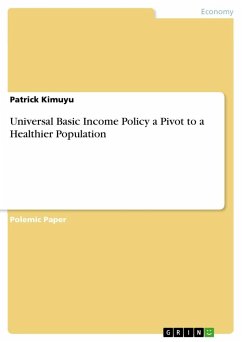Seminar paper from the year 2014 in the subject Economy - Health Economics, grade: 1,30, University of Kassel (Institut für Volkswirtschaftslehre), course: Social Policy, language: English, abstract: In international comparison, Germany ranks 4th among OECD countries in health expenditure as a share of GDP in 2011. It amounted 11.3% of GDP in 2011 which is 2%-points above the OECD average of 9.3%. Only the United States (17.7%), the Netherlands (11.9%) and France (11.6%) are spending more on health. In addition, German health expenditure increased, in real terms, at a rate of circa 2% p.a. on average in 2000-2010, but slowed down to 1.1% in 2011. However, expenditure continues to grow. With regard to these figures, health care is one of the most important sectors in Germany. With more than 6 million employees and a gross value added of almost EUR 268 bn in 2013, it represents 11% of the German economy. While expenditure is on the rise, the number of contributors who finance the health care system decreases. As a result, the question of how to finance the growing demand for health services occurs. In particular, a closer look at the statutory health insurance (SHI) is necessary as it financed 57% of total health expenditure in 2011. Since the report "Achieving financial sustainability for the social security systems" by the Rürup-Commission, two major reform proposals are discussed: the citizens' insurance ("Bürgerversicherung"), a universal system of health care, and a system of flat-rate health premiums ("pauschale Gesundheitsprämien"). These approaches are intensively discussed by politicians and economists who search for an appropriate solution for a health care reform. Therefore, the following question should be answered by this seminar paper: Should we move to a universal, flat rate system? In order to develop an appropriate recommendation, the following questions appear: How does the current health insurance system in Germany look like? Which problems does this system face? What contribution do the two reform proposals provide for a solution of these challenges? Which are the main arguments in favour and against these approaches? Are there any economic consequences of their implementation? What could be a final solution? These questions will be responded in the following seminar paper.
Hinweis: Dieser Artikel kann nur an eine deutsche Lieferadresse ausgeliefert werden.
Hinweis: Dieser Artikel kann nur an eine deutsche Lieferadresse ausgeliefert werden.








